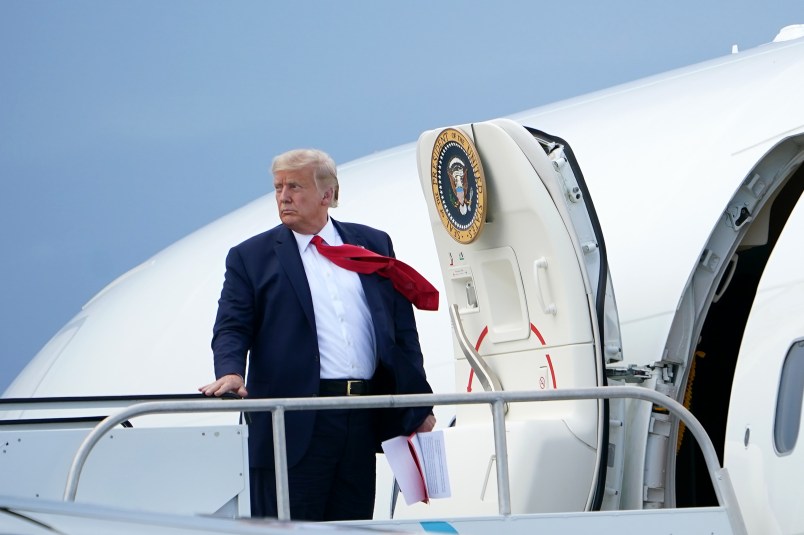President Donald Trump and the Republican Party want their supporters to vote by mail, but they have an odd way of showing it.
In several states across the country, Trump and his campaign are spending to promote mail-in voting at the same time they’re filing lawsuits to make it harder to do so and putting out statements baselessly smearing vote by mail as prone to widespread fraud.
In Pennsylvania, the Trump campaign has challenged steps by election officials to make mail-in voting easier, such as using drop boxes. But a website for the state’s Republican Party skips over the legal scuffle and gets to the point.
“Democrats will use the new mail-in ballot to greatly increase their turn out,” it reads. “Republicans would be smart to do the same so that we have the advantage.” I
In Texas, Republicans sued over Harris County’s plan to send every eligible voter an application to request a mail-in ballot — even though the state’s Republican Party is sending those same applications to all of its voters, just with Donald Trump’s face on the mailer, the Texas Tribune noted.
And in Iowa, where Facebook records show the Trump campaign has encouraged its supporters to request mail-in ballots, the Trump campaign has successfully sued to cancel thousands of those very requests — objecting to county election officials who pre-filled voters’ personal information to make the process easier.
“Republicans are in a tough spot,” observed Rick Hasen, a professor of law and political science at UC Irvine.
“Vote by mail has been a good strategy for getting out the vote for Republicans in the past, and it seems especially important during the pandemic — and especially for older voters who may be more susceptible to getting COVID,” Hasen said. “On the other hand, the President continues to rail against mail-in balloting, and his messaging is that the use of it will lead to a rigged election. There’s not evidence that’s true.”
The pattern has played out nationwide. The Trump campaign spent $200,000 on Facebook ads attacking voting by mail since May, the New York Times reported this month — while at the same time spending $650,000 on Facebook ads to encourage supporters to request absentee ballots.
Meanwhile, Trump’s attacks have been relentless. Last week, he seemed to encourage his supporters to break election law to make a point, suggesting that they vote both via mail and in-person in order to test whether the state’s system was “as good as they say it is.”
And yet last month, Trump’s campaign sent an absentee ballot request to North Carolina voters with his face on it and the text, “URGENT NOTICE.” The mailer included a tweet from Trump calling absentee ballots “fine” — but it blurred the next part of Trump’s tweet that distinguished mail-in-ballots as largely “fraudulent” and “a formula for RIGGING an Election.”
While Trump is railing against vote by mail, his campaign sends out absentee ballot request forms here in NC. (Something he complained about that governments in some states were doing) pic.twitter.com/48TIBRgVog
— tay (@Taylor_Leanne2) August 12, 2020
The Trump campaign, which did not respond to TPM’s request for comment, has at times tried to distinguish between its promotion of mail-in voting to supporters and its opposition to states and counties that proactively send applications or actual ballots to all registered voters.
“While we strongly disagree with the ill-intended Democrat push for more mail-in ballots, we have an obligation to our voters to inform them of what the law is in their state and what their options are,” campaign spokesperson Tim Murtaugh told the Associated Press in May.
But the contradictory messaging could point to a simple numbers problem: No matter what Trump’s interests are in seeding doubt about election results, he needs mail-in voters to win in November.
In Florida, the crucial battleground where many elderly voters have turned to mail-in ballots as a way of avoiding coronavirus risk, Democrats have so far shown a steep advantage in the vote-by-mail game.
Trump himself votes by mail in the state and, it so happens, Florida marked the first exception he made to his histrionic attacks against the practice.
“Whether you call it Vote by Mail or Absentee Voting, in Florida the election system is Safe and Secure, Tried and True,” he tweeted last month.
Election officials in Florida received Trump’s ballot two weeks later, on Aug. 17.
The following day, the Trump campaign filed a lawsuit in New Jersey over the governor’s plan to send all active registered voters a ballot. The complaint cited the threat of fraud that the campaign said was posed by “ballot harvesting — that is, coordinated efforts to have third parties collect absentee ballots from voters and drop them off at polling places or election centers.”
Notably, Trump hadn’t received his ballot in the mail from Florida, the Palm Beach Post reported. Rather, it was delivered to him by a contact in the Republican Party, Alejandro Garcia — a legally designated third party.







You can just smell the desperation. It reeks.
This singular obsession with mail in voting just might make one think there’s some hanky panky going on in the pipeline for voting machines without paper trails. Or even with!
Flailing, falling and failing! That’s Donnie! What a maroon!
I hate them. I really do. Not just for ratfking the country but for sowing hatred and mistrust in their wake.
We should all take a tip from Michael Cohen (ha) and keep those voting receipts! Get a mail in ballot and deliver it to your proper drop box, county clerk’s office, what have you. Make a copy of your ballot also too. Especially if you are in one of those swing state / electoral college districts they’re doing algorithms on.